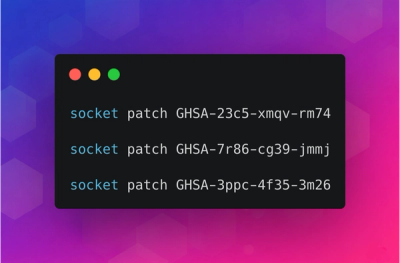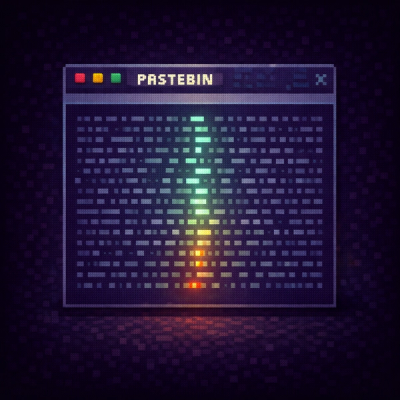
Security News
minimatch Patches 3 High-Severity ReDoS Vulnerabilities
minimatch patched three high-severity ReDoS vulnerabilities that can stall the Node.js event loop, and Socket has released free certified patches.
Note, if you're using @xmpp/client or @xmpp/component, you don't need to install @xmpp/xml.
npm install @xmpp/xml
import xml from "@xmpp/xml";
import { xml } from "@xmpp/client";
import { xml } from "@xmpp/component";
There's 2 methods for writing XML with xmpp.js
import xml from "@xmpp/xml";
const recipient = "user@example.com";
const days = ["Monday", "Tuesday", "Wednesday"];
const message = xml(
"message",
{ to: recipient },
xml("body", {}, 1 + 2),
xml(
"days",
{},
days.map((day, idx) => xml("day", { idx }, day)),
),
);
If the second argument passed to xml is a string instead of an object, it will be set as the xmlns attribute.
// both are equivalent
xml("time", "urn:xmpp:time");
xml("time", { xmlns: "urn:xmpp:time" });
/** @jsx xml */
import xml from "@xmpp/xml";
const recipient = "user@example.com";
const days = ["Monday", "Tuesday"];
const message = (
<message to={recipient}>
<body>{1 + 2}</body>
<days>
{days.map((day, idx) => (
<day idx={idx}>${day}</day>
))}
</days>
</message>
);
Requires a preprocessor such as TypeScript or Babel with @babel/plugin-transform-react-jsx.
The attrs property is an object that holds xml attributes of the element.
message.attrs.to; // user@example.com
Returns the text value of an element
message.getChild("body").text(); // '3'
Get child element by name.
message.getChild("body").toString(); // '<body>3</body>'
Get child element text value.
message.getChildText("body"); // '3'
Get children elements by name.
message.getChild("days").getChildren("day"); // [...]
Since getChildren returns an array, you can use JavaScript array methods such as filter and find to build more complex queries.
const days = message.getChild("days").getChildren("day");
// Find Monday element
days.find((day) => day.text() === "Monday");
days.find((day) => day.attrs.idx === 0);
// Find all days after Tuesday
days.filter((day) => day.attrs.idx > 2);
You can get the parent node using the parent property.
console.log(message.getChild("days").parent === message);
You can get the root node using the root method.
console.log(message.getChild("days").root() === message);
The attrs property is an object that holds xml attributes of the element.
message.attrs.type = "chat";
Set the text value of an element
message.getChild("body").text("Hello world");
Adds text or element nodes to the last position. Returns the parent.
message.append(xml("foo"));
message.append("bar");
message.append(days.map((day) => xml("day", {}, day)));
// <message>
// ...
// <foo/>
// bar
// <day>Monday</day>
// <day>Tuesday</day>
// </message>
Adds text or element nodes to the first position. Returns the parent.
message.prepend(xml("foo"));
message.prepend("bar");
message.prepend(days.map((day) => xml("day", {}, day)));
// <message>
// <day>Tuesday</day>
// <day>Monday</day>
// bar
// <foo/>
// ...
// </message>
Removes a child element.
const body = message.getChild("body");
message.remove(body);
You can embed JSON anywhere but it is recommended to use appropriate semantic.
/** @jsx xml */
// write
message.append(
<myevent xmlns="xmpp:example.org">
<json xmlns="urn:xmpp:json:0">{JSON.stringify(days)}</json>
</myevent>,
);
// read
JSON.parse(
message
.getChild("myevent", "xmpp:example.org")
.getChildText("json", "urn:xmpp:json:0"),
);
See also JSON Containers and Simple JSON Messaging.
@xmpp/xml include a function to parse XML strings.
⚠ Use with care. Untrusted input or substitutions can result in invalid XML and side effects.
import { escapeXML, escapeXMLText } from "@xmpp/xml";
import parse from "@xmpp/xml/lib/parse.js";
const ctx = parse("<message><body>hello world</body></message>");
ctx.getChildText("body"); // hello world
If you must use with untrusted input, escape it with escapeXML and escapeXMLText.
const message = parse(`
<message to="${escapeXML(to)}">
<body>${escapeXMLText(body)}</body>
</message>,
`);
FAQs
XMPP XML for JavaScript
The npm package @xmpp/xml receives a total of 21,227 weekly downloads. As such, @xmpp/xml popularity was classified as popular.
We found that @xmpp/xml demonstrated a healthy version release cadence and project activity because the last version was released less than a year ago. It has 1 open source maintainer collaborating on the project.
Did you know?

Socket for GitHub automatically highlights issues in each pull request and monitors the health of all your open source dependencies. Discover the contents of your packages and block harmful activity before you install or update your dependencies.

Security News
minimatch patched three high-severity ReDoS vulnerabilities that can stall the Node.js event loop, and Socket has released free certified patches.

Research
/Security News
Socket uncovered 26 malicious npm packages tied to North Korea's Contagious Interview campaign, retrieving a live 9-module infostealer and RAT from the adversary's C2.

Research
An impersonated golang.org/x/crypto clone exfiltrates passwords, executes a remote shell stager, and delivers a Rekoobe backdoor on Linux.